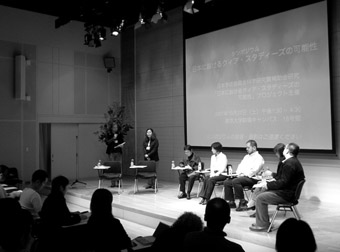Kazuya KAWAGUCHI
Professor, Hiroshima Shudo University
【The article below is the same as the article that appears in the ninth issue of the CGS Newsletter.】
 On October 27th 2007, a General Assembly for the Establishment of the Japan Association for Queer Studies (JAQS) was held at Tokyo University’s Komaba Campus. Close to 300 people braved the terrible weather to attend the session, despite the approaching unseasonal typhoon.
On October 27th 2007, a General Assembly for the Establishment of the Japan Association for Queer Studies (JAQS) was held at Tokyo University’s Komaba Campus. Close to 300 people braved the terrible weather to attend the session, despite the approaching unseasonal typhoon.
In her opening address, Claire Maree stated why JAQS was established. Queer Studies was born from the fruits of two different academic fields ? Lesbian/Gay Studies and Feminism. The constant tension among the three fields gives rise to criticism and denial, but has also contributed to their mutual development and to the expansion of places for the open discussion of gender and sexuality. Moreover, academia and the wider community have been, and will continue to be, inseparable. Despite this long history, the respective relations have often been severed. Thus, Maree declared that the guiding principle of JAQS was to evaluate the present situation and to explore future possibilities by re-evaluating the past. During the conference, a prototype constitution was proposed and passed. This included the objective of JAQS, to provide a unified ground to facilitate the interaction and exchange of research by academics involved in queer studies, as well as the discussion and exchange of information by those engaged in diverse social and cultural activities.
A bill which included regulations for an annual membership fee was proposed and passed (8000 yen for regular members, 5000 yen for graduate/undergraduate students, or those not in full-time employment). JAQS’ activities at present are restricted to editing and publishing the academic journal Rons? Queer and to organizing an annual conference on queer studies.
On the same day of the conference, a public symposium entitled “The Possibilities for Queer Studies in Japan” was held with the suppport of the Japan Society for the Promotion of Science (JSPS) Research Project. The guest speakers were Hitomi Sawabe, Hideki Sunagawa, Aki Nonomiya, Noriaki Fushimi, and Akiko Shimizu, all of whom have been actively engaged in queer-related writing, research, community work or activism. The discussions were based on their own experiences in “writing,”“relations between community, research, and activism,” “generations,” and “the effectiveness (or ineffectiveness) of queer methodology regarding the concepts of feminism and gender studies.” In spite of the differences between the experiences and positions of each speaker, some consensus was reached on the need for research that retains historical continuity which is not divorced from actual practice. The conference certainly proved to be an important place for debating such issues, but the problem of what methodology we should use to deal with these issues, or in other words, how to enable queer studies, remains an issue to be addressed in future. The Q&A session with the audience raised many emotional questions concerning real life problems. These questions again highlighted the need for the intervention of queer studies in a multitude of fields in society, including education and research.
Many were able to attend the fellowship banquet held after the conference even though some were forced to head home due to the typhoon. No matter how much queer research is carried out on an individual level, opportunities for deepening exchange among researchers are still few and far between. I felt that JAQS will continue to play an important role in facilitating the exchange of research in queer studies and the interaction of academics with the wider community.
*Mr. Kawaguchi is one of the many callers for the foundation of The Japan Association for Queer Studies (JAQS).